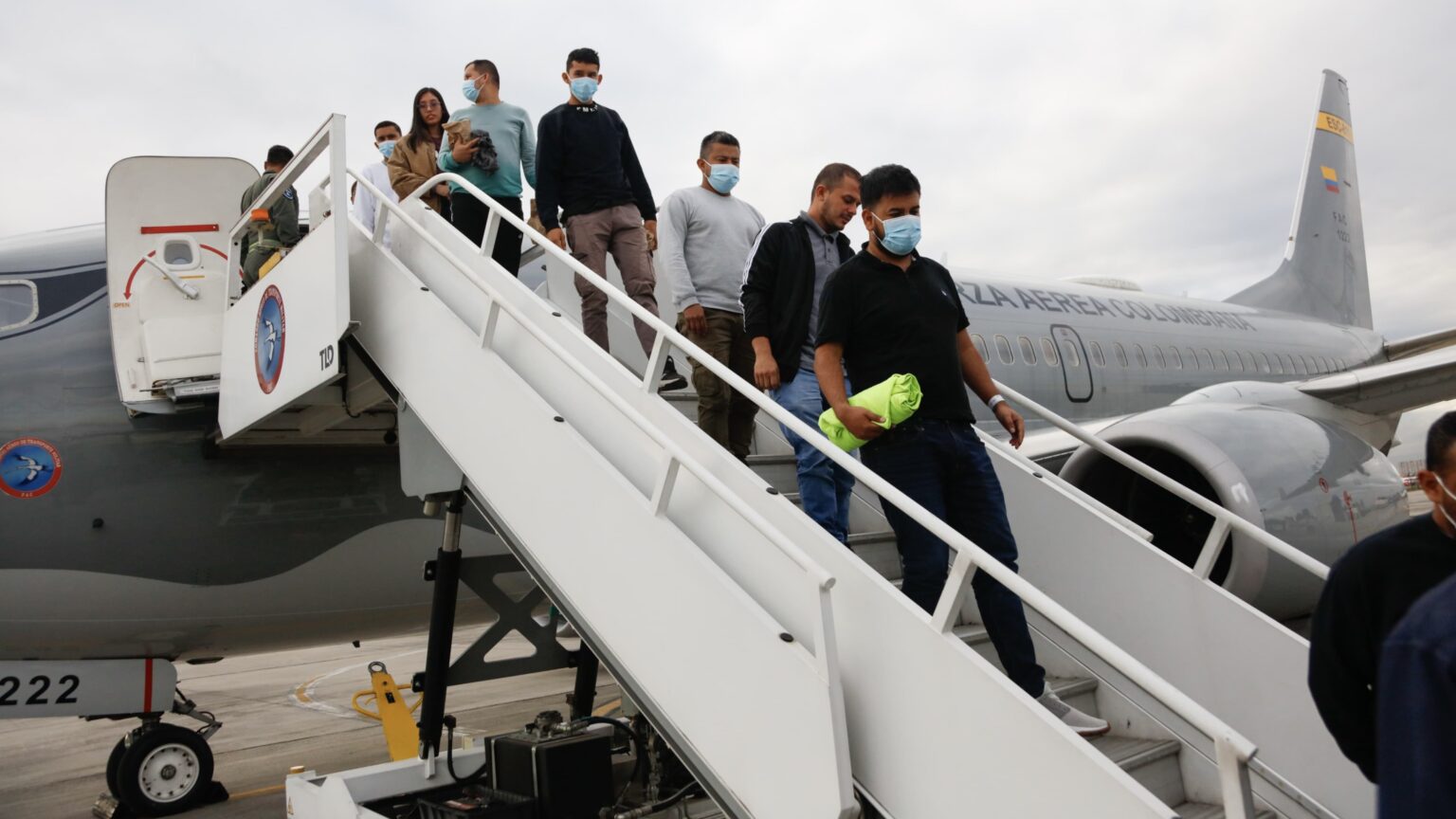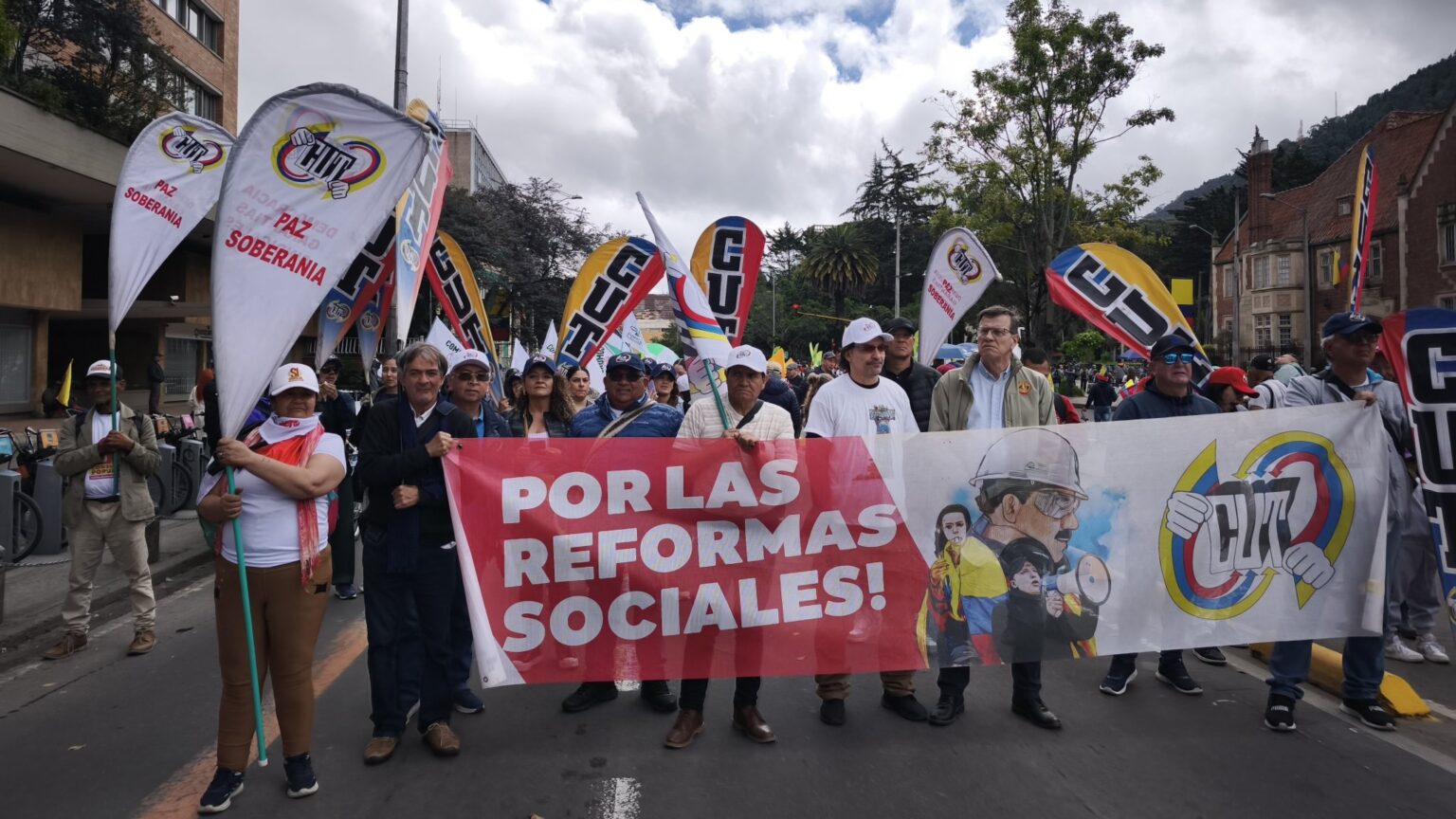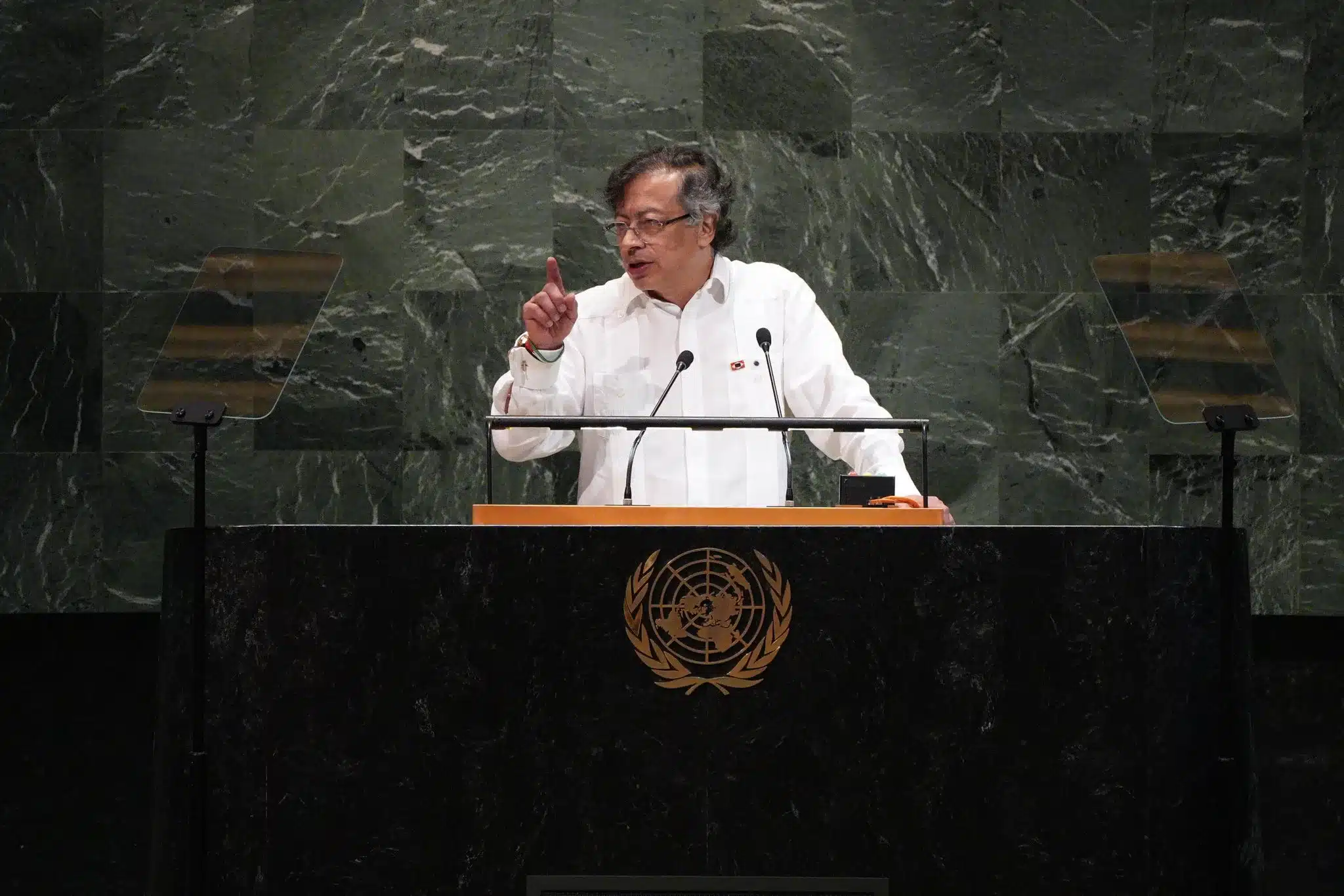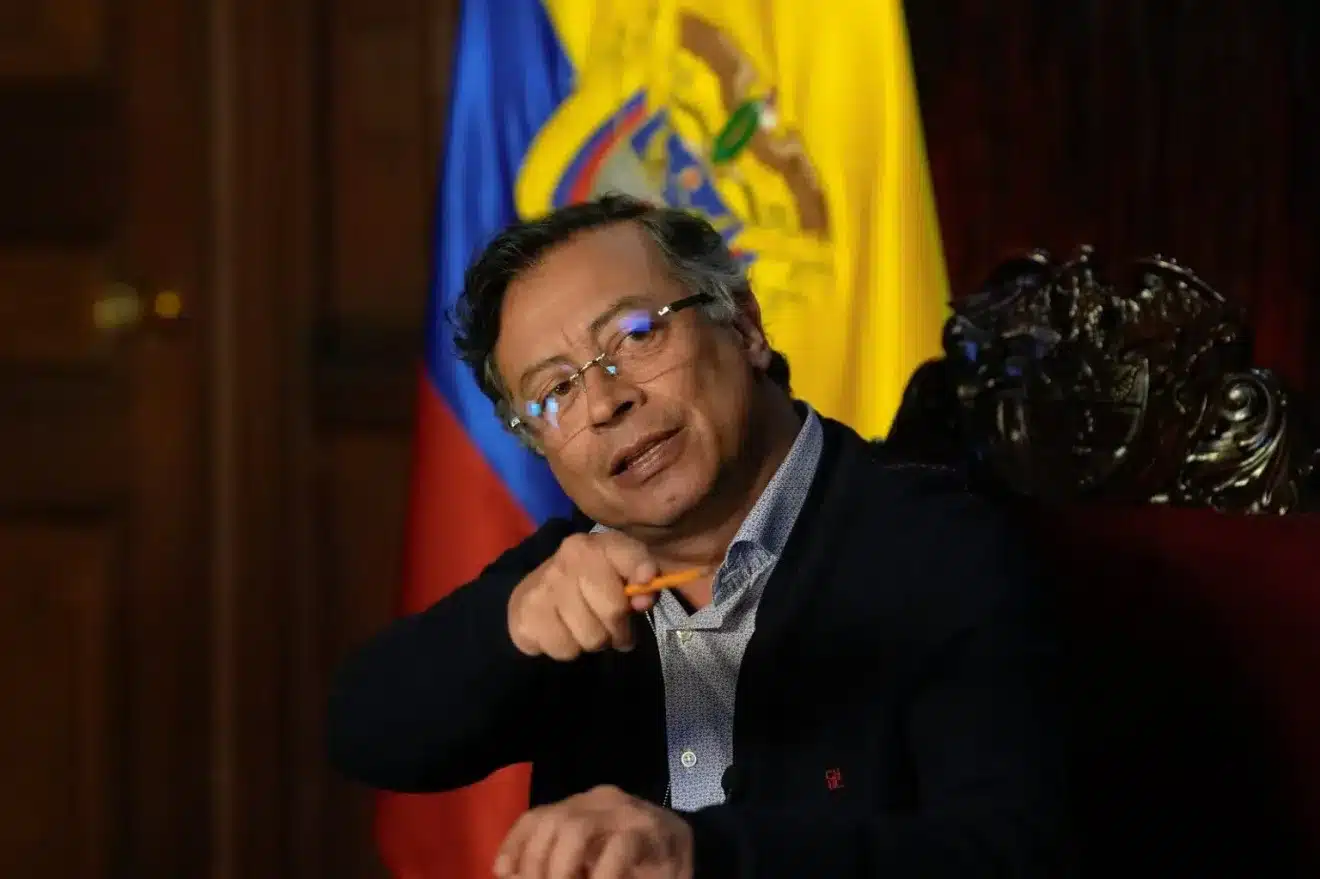After the diplomatic impasse between Washington and Bogotá, the Colombian government announced the Colombian deportees received humanitarian treatment on the flights.
January 28, 2025 by Pablo Meriguet

Colombian migrants returning on a Colombian Air Force plane on January 28. Photo: Cancilleria Colombia / X
Colombian migrants arrived safely back to their home country from the United States on January 28, after a brief but tense diplomatic impasse between the two countries. The migrants had initially been put on US military planes on Saturday, January 25 to be deported back to Colombia. However, early on Sunday, President Gustavo Petro stated that he would refuse to receive planes full of Colombian migrants if they were not treated with dignity.
The exchange quickly escalated, with Trump threatening to impose heavy tariffs on the country and sanctions on Colombian officials, and Petro threatening to impose reciprocal tariffs. After several high-level talks between the Secretaries of State of both nations on Sunday evening, both sides announced that they had overcome the conflict. However, while the Colombian Foreign Ministry maintained that Colombia would continue to demand respect for its compatriots, the White House claimed that Colombia had accepted all the measures requested by Washington.
On January 27, the Colombian Foreign Ministry announced in a statement that the National Government had, through negotiations, arranged for the 110 Colombians to return to their country on a Colombian Air Force, “complying with the protocols established for the dignified return and with guaranteed rights for Colombians arriving on deportation flights.” It detailed that there would be “Colombian Immigration officials, as well as personnel from the Foreign Ministry’s coordination of assistance to nationals, and medical personnel” aboard the flight in order to “guarantee respect for the rights of the citizens and to carry out medical monitoring if necessary. It is expected that in the next few days, another plane will leave with the same objective.”
In a video, dozens of Colombian migrants can be seen returning to their country in a Colombian airplane of the Colombian Air Force (FAC) without handcuffs or being tied by their feet, as were the hundreds of Latino migrants recently expelled from the United States.
Upon arrival in Colombia, deportees reported mistreatment by US immigration authorities in statements to media outlets. One young man denounced, “From the beginning they mistreated us, they threw away our clothes, they did not let us bathe, they woke us up at 3 am, they waited for us to go to sleep and an hour later they woke us up, they yelled at us, some of us were beaten [by US officials].” According to the same person, the intervention of the Colombian government did change the treatment of the deportees “The last day they let us bathe, they let us brush our teeth, they treated us well.”
The deportation flight back to Colombia proceeded after President Gustavo Petro had on Sunday refused to receive a flight full of deportees in protest of the inhumane… pic.twitter.com/NToPn5t4On
— Peoples Dispatch (@peoplesdispatch) January 28, 2025
Regarding the second plane that arrived in Colombia, the Colombian Foreign Ministry informed: “The second plane from San Diego (California), with 110 Colombians deported by the United States Government, has already landed at the CATAM Military Airport. The well-being of our fellow citizens and the guarantee of their rights is a priority of the Colombian Government.”
Responses from Latin America
The Trump administration’s mass deportation campaign continues, and while progressive governments such as those of Colombia, Mexico, and Brazil have raised their voices in protest, they can do little to prevent Washington from carrying out its migratory mechanisms.
In this sense, Colombian Congresswoman María Fernanda Carrascal posted on X: “Put aside the gossip and get ready, because what is coming depends only on Trump, the protectionist policies that he has already announced and that include tariffs not only for Colombia, as well as the persecution of migrants, are a fact.”
She emphasized: “What depends on us is how we take on the situation, the government must be protected, and we must join forces with the region, letting ourselves be trampled on cannot be the way. We must look for ways out and other markets, other currencies to trade, all the possible alternatives.”
For now, Latin America is at a crossroads. It is deeply divided between presidents aligned with Washington’s foreign policy, and those of progressive and leftist governments, who have publicly criticized the United States for its treatment of their migrants.
The region faces an unprecedented situation with the massive repatriation of their citizens. Leaders must balance defending their migrants, while also preparing for the immediate effects the deportations will have on local economies, especially the drastic reduction in remittances and a possible rapid increase in the job-seeking population.
https://peoplesdispatch.org/2025/01/28/ ... handcuffs/
******
Trump Against Colombia
Posted by Internationalist 360° on January 27, 2025
La Jornada

The racist discourse promoted by the new government of the United States against migrants in his country found a breaking point yesterday in the decision of the Colombian president, Gustavo Petro, not to allow the arrival of flights with expelled people because they were not being treated with the dignity that a human being deserves. The day before, the president of Brazil, Luis Inácio Lula da Silva, demanded explanations for the degrading treatment of 88 Brazilian citizens deported the day before, whom Washington sent back to their country in military planes and who traveled bound hand and foot and spent several hours without air conditioning, without being able to drink water or go to the bathroom during the flight.
The situation escalated rapidly: in response, Donald Trump announced the imposition of tariffs on Colombian exports and the suspension of visa delivery by his consular services in the South American nation, to which Petro replied that he would adopt reciprocal measures, in addition to calling a meeting of the Community of Latin American and Caribbean States (CELAC) to analyze the aggressiveness of the new U.S. government against migrant workers.
Hours later, the Palacio de Nariño announced that the impasse had been “overcome” and that Petro’s presidential plane is ready to transport the Colombian deportees, guaranteeing them dignified conditions as subjects of law and the upcoming trip of a government team from Bogota to Washington headed by Foreign Minister Luis Gilberto Murillo to hold high-level meetings to follow up on the agreements and that the diplomatic channels of dialogue between the two countries will be maintained.
For its part, the White House issued a statement in which it assured that the Colombian government had “agreed to all of President Trump’s terms, including the unrestricted acceptance of Colombian illegals returned by the United States, including (to be carried out in) U.S. military aircraft, without limitation or delay.” that tariffs and other trade sanctions would remain suspended, but that visa suspensions and enhanced customs inspections of Colombian products would continue until the last load (sic) of deported Colombians is successfully returned.
The episode would not be anything more than a characteristic Trump maneuver: carry out an aggressive action against another country, provoke a crisis, start a negotiation and, before it is completed, proclaim that he has defeated his counterpart. However, the infamous provocation of chaining up deportees and transporting them to their countries of origin as if they were strings of slaves has generated an outrage that transcends the Colombian sphere and Petro’s initial response. Even if they are essentially propaganda products to sustain his image as a tough man, Trump’s outbursts have the potential to provoke diplomatic and economic crises that certainly have a high cost for the countries involved in them, but which, added together, will only accentuate Washington’s isolation and its weakening as a world hegemonic power.
With all its military, economic, diplomatic and technological might, the United States cannot fight at the same time with its trading partners in this continent -starting with the main ones, which are Mexico and Canada-, Europe and Asia without going into an accelerated decline that would not be good for anyone.
Certainly, the government in Washington has the legal power to dictate inhumane and ruthless anti-immigration policies in its own territory, but not to violate the human rights of any person, American or foreign, documented or undocumented, nor to behave with transgressive bravado towards the rest of the planet. After all, his Democratic predecessors Bill Clinton, Barack Obama and Joe Biden expelled more foreign workers than Trump and this did not produce any diplomatic crisis.
Colombia President Petro’s Letter to Trump

We are running this dignified response to Trump from Colombian president Gustavo Petro after he refused to allow 2 US military planes loaded with Colombian nationals deported in shackles from landing in the Latin American country. Trump in his anti immigrant crusade responded by threatening Colombia with tariffs of 50% on all Colombian products coming into the US if there wasn’t compliance. As of last night a tentative agreement has been reached between the two countries and Petro has sent Colombian planes to return them in a humane way. The corporate media is saying that Petro backed down but if you read this you will see a defiance against this anti immigrant revival of the Monroe Doctrine. How much indignity are the countries of Latin America supposed to endure? –editor
“I don’t want slave drivers on Colombia’s side, we already had many and we freed ourselves”
“Trump, I don’t really like traveling to the US, it’s a bit boring, but I confess that there are meritorious things, I like going to the black neighborhoods of Washington, there I saw an entire fight once in the US capital between blacks and Latinos with barricades, which seemed like bullshit to me, because they should unite.
“I confess that I like Walt Whitman and Paul Simon and Noam Chomsky and Miller.
“I confess that Sacco and Vanzetti, who have my blood, in the history of the USA, are memorable and I follow them. They were assassinated for being labor leaders with the electric chair, the fascists that are inside the USA as well as inside my country.
“I don’t like your oil, Trump, you’re going to end the human race through greed. Maybe one day, over a drink of whisky which I accept, despite my gastritis, we can talk about this frankly, but it’s difficult because you consider me an inferior race and I am not, nor is any Colombian.
“So if you know anyone stubborn, it’s me, period. With your economic strength and your arrogance you can try to stage a coup d’état like they did with Allende. But I die in my law, I resisted torture and I resist you. I don’t want slavers alongside Colombia, we’ve had enough of them and we freed ourselves. What I want alongside Colombia are lovers of freedom. If you can’t be with me, I’ll go elsewhere. Colombia is the heart of the world and you didn’t understand that. This is the land of yellow butterflies, of the beauty of Remedios, but also of the Aureliano Buendía colonels, of whom I am one, perhaps the last.
“You will kill me, but I will survive in my people, which comes before yours, in the Americas. We are the people of the winds, the mountains, the Caribbean Sea and freedom.
“You don’t like our freedom, okay. I don’t shake hands with white slavers. I shake the hands of the white libertarians who are the heirs of Lincoln and of the black and white peasant boys of the USA, before whose graves I have cried and prayed on a battlefield, wherever I may end up, after climbing the mountains of the Italian Tuscan and after saving myself from Covid.
“They are the USA and I kneel before them, before no one else.
“Kneel for me, Mr. President, and the Americas and humanity will respond.
“Colombia, now stop looking north, look at the world, our blood comes from the blood of the Caliphate of Córdoba, the civilization at that time, of the Latin Romans of the Mediterranean, the civilization of that time, who founded the republic, the democracy in Athens; our blood has the black resisters turned into slaves by you. In Colombia is the first free territory in America, before Washington, in all of America, there I take refuge in its African songs.
“My land is of gold and silver work existing in the time of the Egyptian pharaohs, and of the first artists in the world in Chiribiquete.
“You will never dominate us. The warrior who rode through our lands, shouting freedom and who is called Bolívar, is opposed.
“Our people are somewhat fearful, somewhat shy, they are naive and kind, loving, but they will know how to win the Panama Canal, which you took from us by violence. Two hundred heroes from all over Latin America lie in Bocas del Toro, present-day Panama, formerly Colombia, whom you murdered.
“I raise a flag and as Gaitán said, even if I am alone, it will continue to fly with the Latin American dignity that is the dignity of America, which your great-grandfather did not know, and mine did, Mr. President immigrant in the USA.
“Your blockade does not frighten me; because Colombia, as well as being the country of beauty, is the heart of the world. I know that you love beauty as I do, do not disrespect it and it will give you its sweetness.
“COLOMBIA AS OF TODAY OPENS ITSELF TO THE WHOLE WORLD, WITH OPEN ARMS, WE ARE BUILDERS OF FREEDOM, LIFE AND HUMANITY.
“I have been informed that you are charging a 50% tariff on our fruits of human labor to enter the US, I will do the same.
“May our people plant the corn that was discovered in Colombia and feed the world.”
Source: Cubadebate translation Resumen Latinoamericano – English
Trump, a mi no me gusta mucho viajar a los EEUU, es un poco aburridor, pero confieso que hay cosas meritorias, me gusta ir a los barrios negros de Washington, allí ví una lucha entera en la capital de los EEUU entre negros y latinos con barricadas, que me pareció una pendejada,…
— Gustavo Petro (@petrogustavo) January 26, 2025
https://libya360.wordpress.com/2025/01/ ... -colombia/








